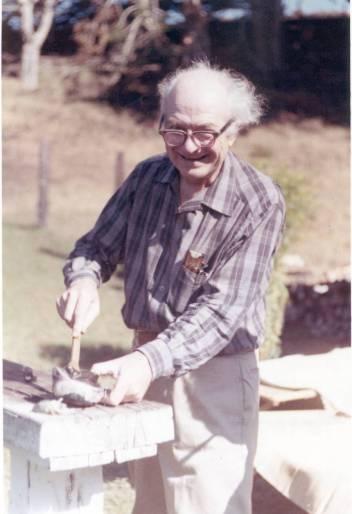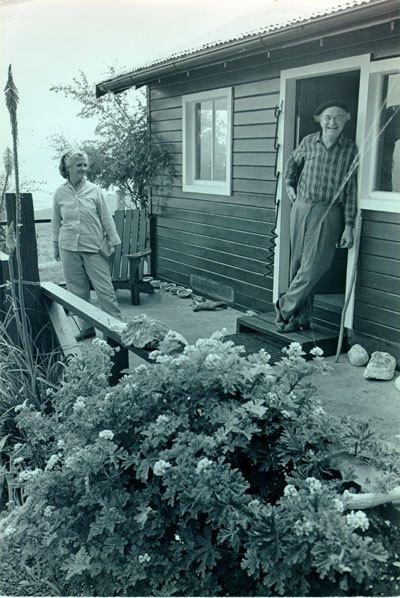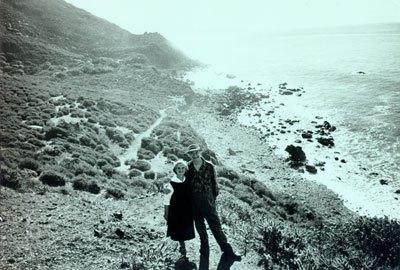
Linus Pauling harvesting abalone, 1963.
[The story of Deer Flat Ranch: Part 2 of 3]
In the years immediately following Linus and Ava Helen Pauling’s purchase of Deer Flat Ranch, the space quickly fulfilled its potential as a refuge from an extremely busy existence. A few years after buying the property, Ava Helen told her husband
Do you know, we have been here for one week, you and I, without seeing a single other person? This is the first time in our 40-odd years of marriage that this has happened.
More than a refuge even, the ranch gradually emerged as a kind of paradise for the Paulings. One could reliably harvest ten abalone off the adjacent rocks at low tide, and Linus found that he greatly enjoyed harvesting these sea snails with his wife, pounding them shoreside to tenderize them for dinner.
At the ranch, a horse and a goat kept the cattle company, and marine life including otters and sea lions frequented the beaches. The Paulings also enjoyed collaborating on landscaping chores at the ranch, a pleasure that continued for Linus even after a 1960 incident that resulted in poison oak rashes on both arms.

Outside the old cabin at Deer Flat Ranch, 1962. Photo by Arthur Dubinsky.
During his solo trips to the property, Pauling frequently withdrew into a world of history and philosophy. Pauling’s literary and intellectual interests ranged far and wide, and his reading included the poetry of the Greek atomist Lucretius, the rhetoric and philosophy of the great Roman orator, Cicero, and the metaphysical proto-evolutionary poetry of Charles Darwin’s uncle, Erasmus Darwin. Pauling’s Deer Flat reading list also included a history of British chemistry, as well as Bertrand Russell’s essay, In Praise of Idleness, within which Pauling underlined the quote, “A busy man doesn’t think.”
While at the ranch in the early fifties, Pauling also made note of re-reading Frederick Metcalf Thomas’s Estragia para la Supervivencia, a work developed from Thomas’s thesis. Pauling had read the thesis several years earlier and had even suggested it to Albert Einstein, who followed up on Pauling’s tip and liked it so much that he subsequently wrote the preface for the text, once it was published as a book. While going through the work again at Deer Flat Ranch, Pauling underlined another quote that surely resonated with him: “The enslavement of scientists will not provide a solution for world problems.”

The Paulings at their ranch, 1964. Photo by Arthur Herzog.
Though Pauling clearly understood the importance of leisure and relaxation, work was still never far from his mind on these visits, be it chemistry, medicine, or world affairs. By 1962, Pauling was writing the third edition of his successful textbook, College Chemistry, entirely at the ranch, typically devoting one week per month to the project while at the Old Cabin, undisturbed by the outside world.
In the 1960s and 1970s, Pauling also spent his time at the ranch thinking about a wide range of problems in chemistry. Among these were the promotion energy of hydrogen atoms; dihedral angles in H2O2 and other molecular structures; the stability of the N2 molecule; electron bonds; antiferromagnetic theory; and much, much more. The bulk of Pauling’s research notebooks from this period consist of musings on current papers in chemistry representing significant problems, and he seemed to want to deduce the solutions to all of them, sitting in his cabin with nothing but a pen, paper, slide rule, and the crashing of the nearby waves.
When the nuclear test ban treaty that Pauling had worked so hard to make a reality went into effect on October 10, 1963, Linus and Ava Helen were at the ranch with their close friends and fellow activists, Clifford and Virginia Durr. The couple had gathered at the ranch with the intent to open a bottle of champagne in celebration of the implementation of the treaty. Before they could pop the bubbly however, the Paulings’ ranch manager, Dale Haskin, arrived at the cabin saying that Linus and Ava Helen’s daughter Linda had called the ranger station trying to get ahold of them.
Upon arriving at the station and returning her call (there were still no phone lines at Deer Flat Ranch at that time), Linda revealed to her father that it had just been announced that he was to receive the Nobel Peace Prize, and that it would be bestowed in Oslo in two months time. Linus spent the rest of the day at the ranger station receiving calls and granting interviews, becoming so busy that he and his guests forgot to open their champagne.
